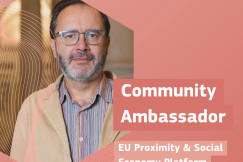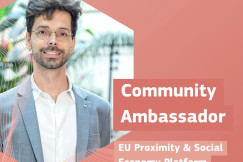Library
22 January 2025
Reimagining Urban Living: Mapping the 15-minute City Practices
Library
22 January 2025
Urban and Rural Wellbeing
Mobility, transport, automotive
Proximity and social economy
+20 more
Login / create an account to be able to react
-
220

The report ‘Mapping of 15-minute City Practices’ (April 2024) examines how 94 cities globally, including 58 in Europe, are implementing the 15-minute City concept to create sustainable, inclusive, and accessible urban environments. It identifies 414 practices focusing on urban mobility, people-centred spaces, smart logistics, and participatory governance. Highlighting pioneers like Paris and Barcelona, the report also features deep dives into cities such as Lisbon and Bologna, showcasing innovative approaches like decentralised services and community engagement. Despite challenges such as governance gaps, it provides actionable strategies for fostering resilient and equitable urban transitions.
Topics
Albania
Armenia
Austria
Belgium
Bosnia and Herzegovina
Bulgaria
Croatia
Cyprus
Czechia
Denmark
Estonia
EU-27
Finland
France
Georgia
Germany
Greece
Hungary
Iceland
Ireland
Italy
Kosovo
Latvia
Liechtenstein
Lithuania
Luxembourg
Malta
Moldova
Montenegro
Netherlands
North Macedonia
Norway
Poland
Portugal
Romania
Serbia
Slovakia
Slovenia
Spain
Sweden
Switzerland
Türkiye
Ukraine
Business Support Organisation
EU Institutions
Financial Institutions and Investors
International Organisations
Local Authorities
Media / Journalist Organisations
National authorities
NGOs / Non-profits
Regional Authorities
Social Economy Entity
-
Thematic area
-
-
Urban and Rural Wellbeing
-
-
Interlinkages with other sectors
-
-
Mobility, transport, automotive
-
Proximity and social economy
-
-
Action areas and keywords
-
-
15-minute city
-
Clusters (including Cluster of social and ecological innovation)
-
Digital Platforms
-
Future workplaces
-
Greening infrastructures and business operations
-
Housing
-
Innovation
-
Innovation as enabler for green transition and business development in the social economy
-
Internationalisation
-
Local Green Deals, green business communities and citizens’ initiatives
-
Local Markets
-
Micro mobility
-
New business models
-
Smart mobility
-
Socially oriented territorial regeneration
-
Strategy for Data
-
-
Ecosystem focus
-
-
Proximity economy
-
Social economy
-
-
Scope of activity
-
-
Local/neighbourhood
-
Regional
-
Share
The report ‘Mapping of 15-minute City Practices’ (April 2024), published under the 15-minute City Transition Pathway by the European Partnership Driving Urban Transitions to a Sustainable Future (DUT), explores the 15-minute City (15mC) concept. It provides insights into the implementation of this human-centric urban planning framework across 94 cities globally, with 58 in Europe. The report combines mapping, case studies, and typologies to highlight diverse approaches to implementing the 15mC concept, from transforming public spaces and enhancing mobility to fostering community engagement. By addressing challenges like governance gaps and logistical barriers, it offers actionable strategies for achieving equitable urban transitions that benefit all residents.
Key findings from the report:
- Global and European leadership in 15mC practices: The report identifies 94 cities implementing 15mC strategies, with European cities such as Paris, Barcelona, and Milan emerging as pioneers. Paris’ Ville de Quart d’Heure introduces multipurpose buildings, while Barcelona’s Superblocks repurpose road space for pedestrians and green areas.
- Innovative approaches to urban mobility: Sustainable urban mobility practices like cycling infrastructure, pedestrian-friendly spaces, and mobility hubs are transforming urban landscapes. Examples include Hamburg’s cargo-bike delivery zones and Melbourne’s participatory planning to improve walkability.
- Decentralisation and community engagement: Cities such as Lisbon and Bologna exemplify the power of localisation. Lisbon’s ‘Há Vida No Meu Bairro’ initiative engages residents in urban and neighbourhood planning, while Bologna’s proximity agents foster community collaboration in service design and governance.
- Adoption and typologies: Based on diversity, scope, and number of 15mC practices, cities are categorised into five types - innovators, early adopters, early majority, late majority, and aspiring newcomers. Innovators like Paris and Melbourne demonstrate comprehensive, scalable strategies, inspiring others to follow suit.
- Deep dives into case studies: Six European cities Paris, Lisbon, Bologna, Vienna, Edinburgh, and Ghent offer insights into adapting the 15mC concept to unique local contexts. Strategies include decentralised services, mixed-use developments, and participatory budgets.
- Barriers to implementation: Challenges include resistance to road space reallocation, logistical issues in urban delivery, and governance gaps between cities and surrounding areas. Overcoming these barriers requires integrated approaches and innovative frameworks.
The report highlights the transformative potential of the 15-minute City concept in fostering sustainable, equitable, and liveable urban spaces. By aligning urban planning with the principles of the proximity economy, it provides a pathway for addressing global challenges like climate change and social inequality while building resilient local communities. Lessons from pioneering cities highlight the importance of community engagement, cross-sector collaboration, and data-driven monitoring to scale successful practices.
For policymakers and stakeholders, this report offers a blueprint for leveraging the 15mC framework to create inclusive cities that prioritise people, sustainability, and innovation. Despite challenges, the concept represents a significant opportunity to drive urban transitions that align with the goals of the social and proximity economy.
Documents
Comments (0)
See also
-
4
Urban and Rural Wellbeing Highlights: December 2024 and January 2025
- Categories
- Proximity and social economy Agri-food Construction +62 more
-
97
PSE Platform Ambassador highlight: Flaviano Zandonai and National Consortium CGM
- Categories
- Partnerships Regenerative Green Transition Skills +68 more
-
11
PSE Platform Ambassador highlight: Jaume Puigpinós Serra, Taula del Tercer Sector
- Categories
- Partnerships Regenerative Green Transition Skills +68 more




